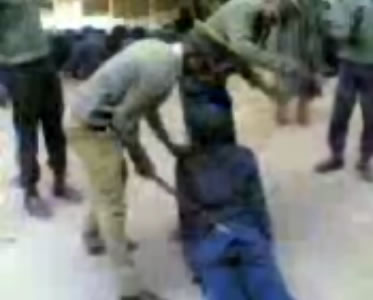Fighting stigma with stigma
Wednesday, June 3rd, 2009 by Fungai MachiroriFirst it was the Pope peddling misinformation about condoms. And now, recently, it was the turn of a Swazi Member of Parliament to fuel stigma around HIV and AIDS.
As a measure to avoid the onward transmission of the virus, the MP, Timothy Myeni, suggested that those who have tested positive for HIV be marked on their buttocks with a special insignia to warn possible lovers of their status. This, he was quoted as saying, would assist possible sexual partners in verifying the status of the other person prior to engaging in intercourse.
After much backlash, Myeni later retracted the suggestion claiming that it had been a trap set by the devil to destroy his name.
If anything, it seems to me to me that this was a trap set by Myeni to destroy the name of people living with HIV.
A person’s HIV status is a confidential issue, to be disclosed as and when an individual feels ready to do so. Branding people only helps to peddle the stigma and discrimination that people with HIV already experience. In other words, labelling people living with HIV would only serve to make them feel more ostracised and unwelcomed – as though they were an untouchable and unlovable caste.
And before his utterances, Myeni really should have thought through the process of how this whole operation would be carried out. Would such branding take place soon after an HIV test? And how?
Imagine the scenario of visiting an HIV testing centre, testing positive for HIV and then being told to proceed to another area to have your buttocks stamped with a sign that states your positive status. Would this really encourage more people to get tested? Very unlikely.
Besides, as was noted by an Oxfam representative, Jacob Nanjakululu, at the recent Global Citizens Summit in Nairobi, Kenya, 90% of people living with AIDS do not know their status. Therefore, such practices as branding those who dare to find out their status would only lead to an increase in the number of people who do not know their status.
The consequences of such lack of knowledge could be dire, as more people could potentially, and unknowingly, transmit the virus on to their sexual partners, thereby creating a web of new infections, and a greater burden of need for treatment, care and support services.
Is that we really want or need in a world that should be becoming more tolerant towards people living with HIV? And are we saying that people with HIV cannot and will not disclose their status to their sexual partners, otherwise? Surely, such thinking makes people living with HIV out to be little children who cannot think or act on their own.
While discussing this issue with a colleague, he told me that in Malawi, a certain chief had suggested that people found to be HIV positive should have a permanent scar etched onto their foreheads so as to warn all other villagers of the potential danger these people posed to their health. This is not much different to what Myeni had proposed, and equally hard to understand.
How sad it is that people try to fight stigma with yet even more stigma.
Rather than focusing on branding people, I say it’s time to focus on providing them with treatment and other requisite services. But even more importantly, it’s time to start loving them and respecting them as human beings.










